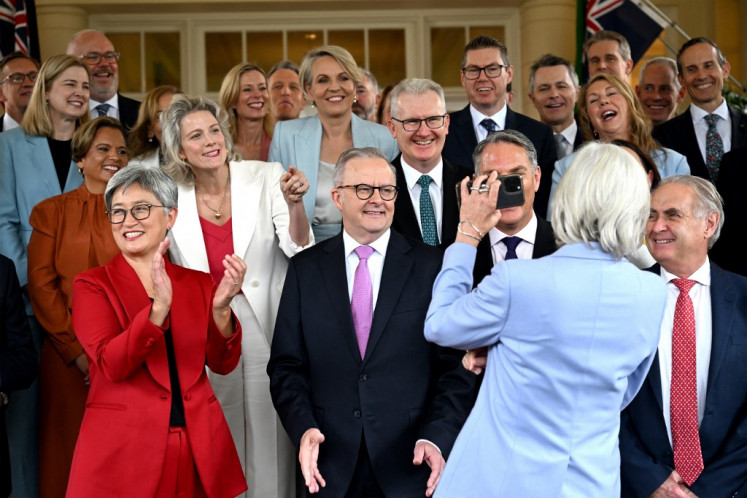LITERARY AFFAIRS in Frankfurt
Fact and fiction: Indonesian author Seno Gumira Ajidarma (right) is engaged in a discussion titled “soul mates: fact and fiction” with Belgian author David Van Reybrouck (center) and moderator Alexandra Koch at Indonesia's stand at the Frankfurt Book Fair on Wednesday
Change text size
Gift Premium Articles
to Anyone

Fact and fiction: Indonesian author Seno Gumira Ajidarma (right) is engaged in a discussion titled “soul mates: fact and fiction” with Belgian author David Van Reybrouck (center) and moderator Alexandra Koch at Indonesia's stand at the Frankfurt Book Fair on Wednesday. (JP/Stevie Emilia)
Witnessed by a full-house audience at the Congress Center Messe Frankfurt, the worlds oldest and biggest book fair officially opened its doors on Tuesday evening, with special attention given to Guest of Honor Flanders and the Netherlands.
Stars of literature were given the red carpet treatment alongside kings and queens and other dignitaries at the 68th Frankfurt Book Fairs opening ceremony on Tuesday evening.
The ceremony was attended by King Willem-Alexander of the Netherlands as well as Belgian King Philippe and Queen Mathilde who then jointly opened the pavilion of this years Guest of Honor, Flanders and the Netherlands.
The moment was also used by the speakers to raise pleas for Turkey to release jailed writer and rights activist Asli Erdogan, who was arrested in August alongside 20 journalists.
European Parliament President Martin Schulz in his speech called on the Turkish government to set those people free, while the head of the German Publishers and Booksellers Association, Heinrich Riethmüller, read out Erdogan’s heart-breaking letter that he said had been smuggled out of her prison and urged people to sign a petition calling for her release.
Indonesia’s National Book Committee chairwoman Laura Prinsloo found the opening ceremony different from last year’s when Indonesia was the fair’s Guest of Honor.
While Indonesia had displayed the country’s rich culture through poetry, melodies and performances, this year, two authors from the Guest of Honor staged an engaging conversation.
“German friends said the opening ceremony was very European because of the long and passionate speech. But all in the audience listened with their heart,” Laura said.
With two countries named as Guest of Honor this year — not just one, she said it was time for Indonesia to pick up something and learn. “Who knows, ASEAN countries could be the fair’s countries of focus next,” she said.
The committee, set up by the Ministry of Education and Culture earlier this year, aims to build on the foundation set by Indonesia’s successful presentation in Frankfurt last year.
The committee has worked aggressively to promote Indonesian literature at numerous book fairs and has started to distribute funds for the translation of Indonesian works into foreign languages as well as to send Indonesian writers to join a residency program overseas.
At this year’s fair, the ministry and the committee are getting support from the Creative Economy Agency (Bekraf), and although Indonesia has a much-diminished presence at the fair compared to last year, they aim to impress.
For this year’s fair, Indonesia will present nearly 90 events and feature 11 authors, 10 performers and more than two dozen special guests and speakers from 12 different countries until Sunday, the closing day.

Royal support: King Willem-Alexander of the Netherlands (second right) is among royal attendees at the 68th Frankfurt Book Fair’s opening ceremony on Tuesday evening.
Indonesia’s National Stand, designed by architect Andro Kaliandi, highlights the “17,000 Islands of Imagination” theme, with the fluidly shaped shelves resembling rice terraces.
The committee’s steering committee member Goenawan Mohamad, who led Indonesia’s delegation to last year’s fair, praised the team for working hard to make this year’s presence another success.
However, he pointed out a need to get rid of overlapping bureaucracy and uncertainties that put pressure not only to the committee but also on participating authors, publishers and creative teams.
Indonesia’s delegation to last year’s fair, he said, had been praised and was considered successful in setting the foundation for international branding as desired by President Joko “Jokowi” Widodo — while overlapping bureaucracy and too many regulations did not help.
He acknowledged there had been progress after last year’s Frankfurt Book Fair, citing the translation funding and writers residency programs as examples. “But these progresses should not stop just at this, we should work for more,” Goenawan said.
The committee’s literary promotion and international fair coordinator Sari Meutia said Indonesia’s participation was not just to follow trends and should be treated like other trade events.
“We plan for the programs to reach their goals,” said Sari, who is also the CEO of publishing houses Mizan and Pelangi Mizan, citing programs like Happy Hour to Tea Time with Publishers to attract other publishers.
For author M. Aan Mansyur, the fair is a big opportunity to see many things, mainly to fulfill his job as a writer — to read.
“For writers, this is the place to interact with the literature world. All this time when we talk about literature, it is mainly about European or American literature, while in fact literature is a big world. And we are here to find out,” said Aan, who has published seven poetry collections.
The fair, he said, also afforded him the opportunity to meet foreign publishers and literary agents. “If we want a wider audience, the book fair is the right place,” Aan said.
---------------------
(Don’t get) Lost in Translation
At the newly opened Frankfurt Book Fair, Indonesia’s delegation agreed on one thing: the need to further push for the translation of Indonesian titles into foreign languages.
Following its successful presence at last year’s fair, where it was the Guest of Honor, Indonesia’s book industry has received the attention it long deserved, selling more translation rights at other important book fairs, from Bologna to London and Beijing.

Wide reach: Translations of Indonesian literary titles play an important role in bringing the stories of Indonesian authors to readers around the world. ((JP/Stevie Emilia))
It has also launched LiTRi, which provides financial assistance to foreign publishers that have purchased translation rights for works of Indonesian literature and other titles of literary quality with the goal to foster circulation of Indonesian literature worldwide.
However, while the program attracted proposals for some 200 titles for shortlisting, it could only afford five titles considering its limited budget.
Siti Gretiani, general manager at Indonesia’s leading publishing house Gramedia Pustaka Utama, said translation was very important to take part at international book fairs.
The publishing house, she said, had a list of significant Indonesian writers and by taking part at international fairs like Frankfurt it could introduce their works to the international market.
Past participation at international book fairs had produced results, she said, disclosing that Gramedia would sign a deal this year with a publisher from England to translate a book by author Ratih Kumala, titled Gadis Kretek (Cigarette Girl). The book was translated into German last year.
At the fair in Bologna, Gramedia sold translation rights for children books, while in Beijing in August this year, the translation rights for a book by Agustinus Wibowo, Titik Nol (Zero), were sold to a Vietnamese publisher. A Chinese publisher, she added, had also shown interest in the book.
“By taking part in international book fairs, we can promote writers works. Otherwise it would be hard for their works to get noticed,” said Siti, who is also the National Book Committees literary promotion and international fair supervisor.
“Publishers usually like to read and learn about the books before buying the translation rights. After we were the Guest of Honor in Frankfurt last year, they start to look at Indonesian books.”
Currently, of some 2,000 titles being released by Gramedia in a year, less than 10 percent are translated into foreign languages. At the national level, the figure is not much different.
“We badly need to get the books translated. Without such translation, at least to English, it will be hard to judge a book. Once we have published books in English for instance, it will be easier for foreign publishers to study and appreciate them [and decide to buy the translation rights].”
The committee’s literary promotion and international fair coordinator Sari Meutia said it was impossible to introduce a book if it was not available at least in English.
“Translating 200 pages into English already costs a lot of money for a publishing house, while we do not know if the book will sell or not,” said Sari, who is also the CEO of the publishing houses Mizan and Pelangi Mizan.
She expressed her expectation that if the government provided further incentives for translating literary works, it would boost the motivation of publishers to sell translation rights and of foreign publishers to buy, adding that internationally acclaimed books usually also enjoyed great sales at home.
The absence of translations also affected many books on Indonesia written by outsiders, something that author M. Aan Mansyur feared exposed people to the danger of a single narrative.
He said currently Indonesia often fell into certain stereotypes — such as Indonesia being just Bali or people being so poor that they wear no clothes — while Indonesians themselves, who know better, should offer their own definition and version.
“For me as a writer that’s an important issue: minimizing single narration. As a writer we have to provide alternatives, the other stories they probably do not know,” he said.
“If we constantly get a single narration, we in the end may end up accepting that definition.”
— JP/Stevie Emilia









